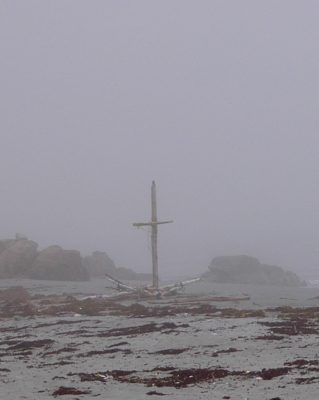Seekers recognizes that any member of the community may be called upon by God to give us the Word, and thus we have an open pulpit with a different preacher each week. Sermons preached at Seekers, as well as sermons preached by Seekers at other churches or events, are posted here, beginning with the most recent.
Click here for an archive of our sermons.
Feel free to use what is helpful from these sermons. We only ask that when substantial portions are abstracted or used in a written work, please credit Seekers Church and the author, and cite the URL.
“Following a Wounded God” by Brenda Seat

The Second Sunday of Easter
April 24, 2022
Good morning!
I am preaching today because I opened my big mouth. A few weeks ago, in one of our Celebration Circle mission group meetings we were discussing the new Easter liturgy we were working on, someone raised a question about certain phrases and I vigorously defended them. Before I knew it, I was signed up to preach this Sunday. I didn’t even know what the Scriptures were until after our mission group meeting was over.
Luckily, the gospel lesson is about Thomas. I have always had a kind of affinity for Thomas. I know he is pejoratively called “Doubting Thomas,” but it always seemed to me that he just said what everyone else was thinking. He just opened his big mouth and said it. So, I feel a certain amount of kinship with Thomas.
“Speaking of Values” by Marjory Bankson

Easter Sunday
April 17, 2022
As we turn to the gospel text assigned for this morning (Luke 24:1-12), we see that there is NO resurrection appearance of Jesus here. (AND of course no Easter eggs, Easter bunnies or Easter bonnets either.) In fact, Luke’s gospel seems, on the surface, pretty bleak. Just an empty tomb and some frightened women.
Can you imagine what it was really like for those Galilean women, picking their way through a stoney graveyard, barely able to see in the early morning light and fearful for their lives? And what they found was a gaping hole where the heavy stone had been rolled away. Nothing more.
But then two men in dazzling clothes DO suddenly appear – scaring them out of their wits. Their dazzling clothes provide a clue — these are angelic messengers. “Why do you seek the living among the dead?” they ask. “He is not here, but has risen.” And then their instructions: “Remember…. Remember….”
“Keeping the Pax Romana During Pascha” by David Lloyd

Palm Sunday
April 10, 2022
I’m glad to see you, Lucas, old friend, and here in Jerusalem! But this is a busy time for me. It is time for Passover, the festival the Jews call Pesach, Pascha, in Latin. Jews are coming into Jerusalem as they do every year, mostly from the eastern half of Mare Nostrum: from Judaea and Galilaea of course, and from Syria, and Cuprum; from Aegyptus, Creta, and Cyrenaica. But some from other parts of the Empire.
The Jews say that the Passover commemorates how a leader named Moishe freed them from slavery in Aegyptus more than a millennium ago. They say their god performed miracles, somehow killing every firstborn Aegyptian male and drowning the Pharoah’s army that was chasing them. It had to be miraculous, because Moishe had no army! In every crowd of Jews during this Passover, someone starts talking about how their god – whose name they are forbidden to say – will drive out our Roman army and bring world peace. Once I said to one, “If so, your god will have to perform another miracle, since you have no legions.” He just smiled, and said, “The Holy One will provide us a Mashiach, a leader.”
“Extravagant Love” by Elizabeth Gelfeld

The 5th Sunday in Lent
April 3, 2022
Good morning! Good morning to all of you in this room with me, and all of you in the Zoom room! How good it is that we are all together! Who among us could have predicted this, two years ago? “Thus says the Holy One,” according to Isaiah, “Forget the events of past, ignore the things of long ago! Look, I am doing something new!”
We’re coming up on the Passover holiday. Jews from all over Palestine are traveling to Jerusalem because that’s where you go, to the holy city to purify yourself for the holiest time of the year. Jesus, too, is on his way to Jerusalem with his disciples, even though they all know that he’s in serious danger: the people in power, the religious leaders, feel threatened by him.
“Trusting God in Changing Times” by Deborah Sokolove

The 4th Sunday in Lent
March 27, 2022
It is now the fourth Sunday in Lent, more than half way through this season that leads inexorably to the last meal that Jesus had with his disciples, his crucifixion at the hands of an occupying empire, and the improbable discovery of his resurrection three days later. This season is traditionally one of revisiting the founding stories of our faith, of learning again to trust God in every aspect of our lives.
And so, for the past three weeks the lectionary readings from the Hebrew scriptures have reviewed the experience of the Israelites as they escaped from slavery in Egypt and arrived in a land “flowing with milk and honey”; God’s covenant with Abram that his descendants would be more numerous than the stars and would possess all the land “from the river of Egypt to the great river, the river Euphrates….”; and the haunting invitation to everyone who thirsts to “come to the waters; and you that have no money, come, buy … wine and milk without money and without price” as God makes clear that the covenant that is not really about land, but about relationship, about trusting God to love us, no matter what.
Today’s reading returns to the aftermath of the escape from Egypt with a pun about a place called Gilgal (the word means something like a wheel or a circle or something that rolls) where, it is written, “The Holy One said to Joshua, “Today I have rolled away from you the disgrace of Egypt.” The rolling away of the stone of disgrace meant there were big changes in store for the people, because “The manna ceased on the day they ate the produce of the land, and the Israelites no longer had manna; they ate the crops of the land of Canaan that year.” And, I suspect, even though the people had earlier rebelled against eating manna night and day, not trusting in the miraculous food that God had provided, now they were equally resistant to the idea of yet another change to their diet.
Meanwhile, the Gospels have reminded us about Jesus being tempted to trust the devil rather than God; his insistence on going to Jerusalem, even though he will probably be killed there; and his warning to the Pharisees that they needed to change their ways. Finally, in today’s reading, we have story about a wayward young person who ran away and then came back, trusting in forgiving love; another young person whose trust and love gave way to bitterness and resentment; and their parent’s unfailing commitment to love and trust them both.

